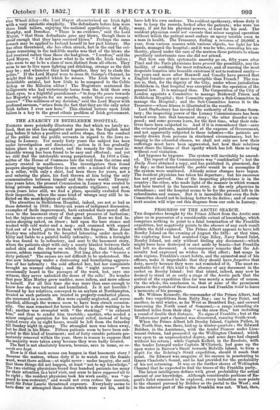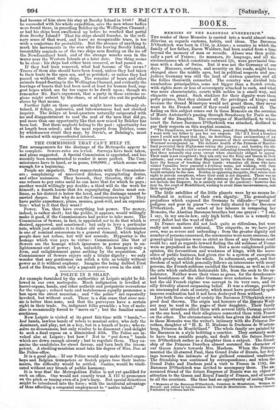PROGRESS OF TILE ARCTIC SEARCH.
THE despatches brought by the Prince Albert from the Arctic sees place us in possession of a considerable extent of knowledge which comprises nothing to point to a fatal termination of the Icankliri expedition, but negatively points to the absence of any such result within the field explored. The Prince Albert appears to have left Beechy Island on the evening of August the 24th: at that time, the exploring force had searched Cape Riley, Navy Board Inlet, Beechy Island, not only without finding any document—which might have been destroyed or cast aside by beasts—but 'Franklin had left no document. A contemporary remarks that the Ad- miralty had expressed no wishes to that effect ; but usage in such regions, Franklin's exact habits, and the animated zeal of his officers, make it improbable that they should have forgotten that duty, merely because they were not reminded of it. The most re- markable fact of this kind is the absence of any document in the cachet on Beechy Island : but that island, indeed, may now be deemed to stand at so early a stage of the Arctic path that the arrival Of the 'expedition thus far was merely a matter of course. On the whole, the conclusion is that at none of the prominent places on the portals of these closed seas had Franklin tried to leave a memento of his passage.
Mr. William Kennedy, the commander of the Prince Albert, had made two expeditions from Batty Bay ; one to Fury Point, and another, in mid winter, as far West as l3rentford Bay,' and onward traversing the North coast of Somerset,—a range extending six hundred miles from their ship "as the crow flies," but including a round of double that distance. No signs of Franklin ;-but at the Westernmost part a channel was discovered, running South-west. When the Prince Albert left Beechy Island, Captain Pullen, in the North Star, was there, laid up in winter-quarters ; Sir Edward Belcher, in the Assistance, with the tender Pioneer under Lieu- tenant Osborn, had proceeded up the Wellington Channel, which was open to an unprecedented degree, and some days had elapsed without his return ; while Captain Kellett, in the Resolute, with the tender Intrepid under Captain M'Clintock, had gone up the open water in Barrow's Strait towards Melville Island, to form a deli& for the Behring's Strait expedition, should it reach that point. Sir Edward was sanguine of his success in penetrating to Queen Charlotte's Sound, and he had provided for the probability of his not returning. It was on the further shores of Wellington Channel that he expected to find the traces of the Franklin party.
The latest intelligence defines with great probability the actual amount of our knowledge. Although considerable portions of Re- gent's Inlet remained to be explored, every indication now points to the channel pursued by Belcher as the portal to the West ; and in the anterior part of the region Franklin was not. What, then,
had become of him since his stay at Beechy Island in 1846 ? Had he succeeded with his whole expedition, save the men whose bodies were found there, in preceding Belcher up the Wellington Channel ; or had his ships been swallowed up before he reached that portal from Beechy Island? That his ships should founder, in the ordi- nary sense of that word, and leave no recognizable trace, is too wide a conjecture for probability. But the absence of anything to mark his movements in the seas after his leaving Beechy Island, irresistibly reminds us of the two ships seen floating on the ice off the Newfoundland bank, and of the strange wrecks seen in the water near the Western Islands at a later date. One thing seems to be clear : his ships had either been removed, or had passed on. If they had been removed, what had become of the crews ? Traces of them also should have been found, unless they had taken to their boats in the open sea, and so perished ; or unless they had passed on without their ships. The remains of bears and other animals found floating in the Wellington Channel, and evidently the leavings of beasts that had been used at least for human food, sug- gest hopes which are far too vague to be dwelt upon; though we remember Mr. Rae's argument, that a party in those extreme re- gions might subsist by the chase, or at least eke out its portable stores by that means.
Further light on these questions might have been already ob- tained, if delays, jealousies, and lukewaxmness had not checked inquiry. The delays at head-quarters naturally cooperated with ice and disappointment to cool the zeal of the men that did go, and more than one opportunity like that now seized by Belcher has been lost. But those neglects belong to the past : opportunity has at length been seized ; and the next reports from Belcher, come by whichsoever strait they may, by Davis's, or Behring's, must be awaited with unprecedented interest



























 Previous page
Previous page